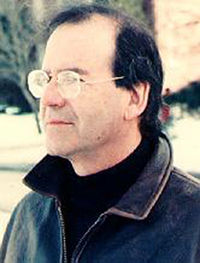- Michael J. Shapiro
-
Michael J. Shapiro 
Michael ShapiroFull name Michael J. Shapiro Born February 16, 1940 Era 20th century philosophy Region Western Philosophy School Political Philosophy, Critical Theory, Cultural Studies, Film Theory, International Relations Theory, Literary Theory, African American Studies, Comparative Politics, Geography, Sociology, Urban Planning, Economics, Psychoanalysis, Indigenous Politics Influenced byMichael Joseph Shapiro (born February 16, 1940) is Professor of Political Science at the University of Hawaiʻi at Mānoa.[1] His work is often described as 'postdisciplinary', drawing on such diverse traditions as political philosophy, critical theory, cultural studies, film theory, international relations theory, literary theory, African American studies, comparative politics, geography, sociology, urban planning, economics, psychoanalysis, crime fiction, genre studies, new musicology, aesthetics and Indigenous Politics.
As the political theorist William E. Connolly has described him: "no one writing in English today has as wide a command over diverse references or develops more profound insights from them".[2]
Contents
Career
Shapiro's early work in political science covered the conventional areas of the discipline, including political psychology, decision theory and electoral politics.[1][3] Around 1980, however, under the influence of philosophers such as Michel Foucault (who became a personal acquaintance [reference]), Shapiro began employing concepts from continental philosophy and cultural studies including governmentality, micropolitics, the movement-image, the time-image, and rhythmanalysis, while introducing uncoventional devices such as first-person narrative into his essays. Shapiro's postdisciplinary political thought is the subject of a forthcoming volume from the Routledge book series "Innovators in Political Theory", which will feature a retrospective of his most important essays in a single volume.
Shapiro is the editor of a book series in political theory (with the University of Edinburgh Press) entitled Taking on the Political; previously, he was editor the journal Theory and Event from 2004–2009, a book series in international studies and comparative politics (with the University of Minnesota Press) entitled Borderlines. Shapiro received his Ph.D in Political Science from Northwestern University in 1966, before moving on to a position as professor and chair of the University of Hawaiiʻi at Mānoa's Political Science Department.[1]
Shapiro has also taught at the University of California, Berkeley (1968–1970), the University of Massachusetts (1979 and 1986), the University of Bergen in Norway (1972–1973), the Tisch School of the Arts at NYU (2002), and the European Graduate School in Saas-Fee, Switzerland.[1][3] With his colleagues at the University of Hawaiʻi at Mānoa Political Science department, Shapiro founded what is sometimes called the "Aloha School."
Interlocutors
Notes
- ^ a b c d "Michael J. Shapiro Faculty Page at European Graduate School (Biography, bibliography and video lectures)". European Graduate School. http://www.egs.edu/faculty/michael-shapiro/biography/. Retrieved 2010-10-03.
- ^ http://books.google.com/books?id=88fBx8XRuycC&printsec=frontcover#PPT1,M1
- ^ a b Michael Shapiro Faculty profile at University of Hawaiiʻi at Mānoa. Department of Political Science
Bibliography
- 1976. Ethical and Political Theory (General Learning Press)
- 1981. Language and Political Understanding: The Politics of Discursive Practices (Yale University Press)
- 1984. Language and Politics, ed. (New York University Press)
- 1988 The Politics of Representation: Writing Practices in Biography, Photography, and Political Analysis (University of Wisconsin Press)
- 1989. The Politics of Language Purism, co-authored with Bjorn H. Jernudd (Mouton de Gruyter)
- 1989. International/Intertextual Relations: Postmodern Readings of World Politics co-edited with James Der Derian (Lexington Books)
- 1991. Reading the Postmodern Polity: Political Theory as Textual Practice (University of Minnesota Press)
- 1995. Challenging Boundaries: Global Flows, Territorial Identities co-edited with Hayward R. Alker (University of Minnesota Press)
- 1997. Violent Cartographies: Mapping Cultures of War (University of Minnesota Press)
- 1999. Cinematic Political Thought: Narrating Race, Nation and Gender (Edinburgh University Press and NYU Press)
- 1999. Moral Spaces: Rethinking Ethics and World Politics (University of Minnesota Press)
- 2001. For Moral Ambiguity: National Culture and the Politics of the Family ( University of Minnesota Press)
- 2002. Reading 'Adam Smith': Desire, History and Value New edition (Rowman & Littlefield)
- 2002. The Politics of Moralizing co-edited with Jane Bennett (Routledge)
- 2004. Methods and Nations: Cultural Governance and the Indigenous Subject (Routledge)
- 2005. Sovereign Lives: Power in Global Politics co-edited with Jenny Edkins and Veronique Pin Fat (Routledge)
- 2006. Deforming American Political Thought: Ethnicity, Facticity, and Genre (University Press of Kentucky)
- 2008. Cinematic Geopolitics (Routledge)
- 2010. "The Time of the City: Politics, Philosophy and Genre" (Routledge)
See also
- American philosophy
- List of American philosophers
External links
- Michael J. Shapiro Faculty Page at European Graduate School. (Biography, bibliography and video lectures)
- An interview with Shapiro by Theory Talks
- Book Review The Politics of Representation: writing practices in biography, photography, and policy analysis
Categories:- 20th-century philosophers
- 21st-century philosophers
- American philosophers
- American political scientists
- American political theorists
- University of Hawaii faculty
- European Graduate School faculty
- 1940 births
- Living people
Wikimedia Foundation. 2010.
